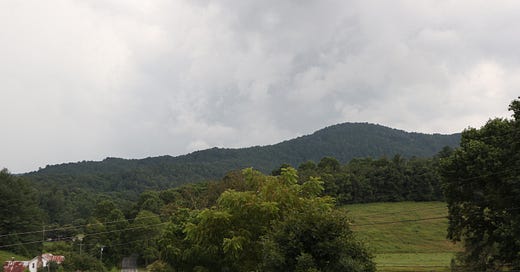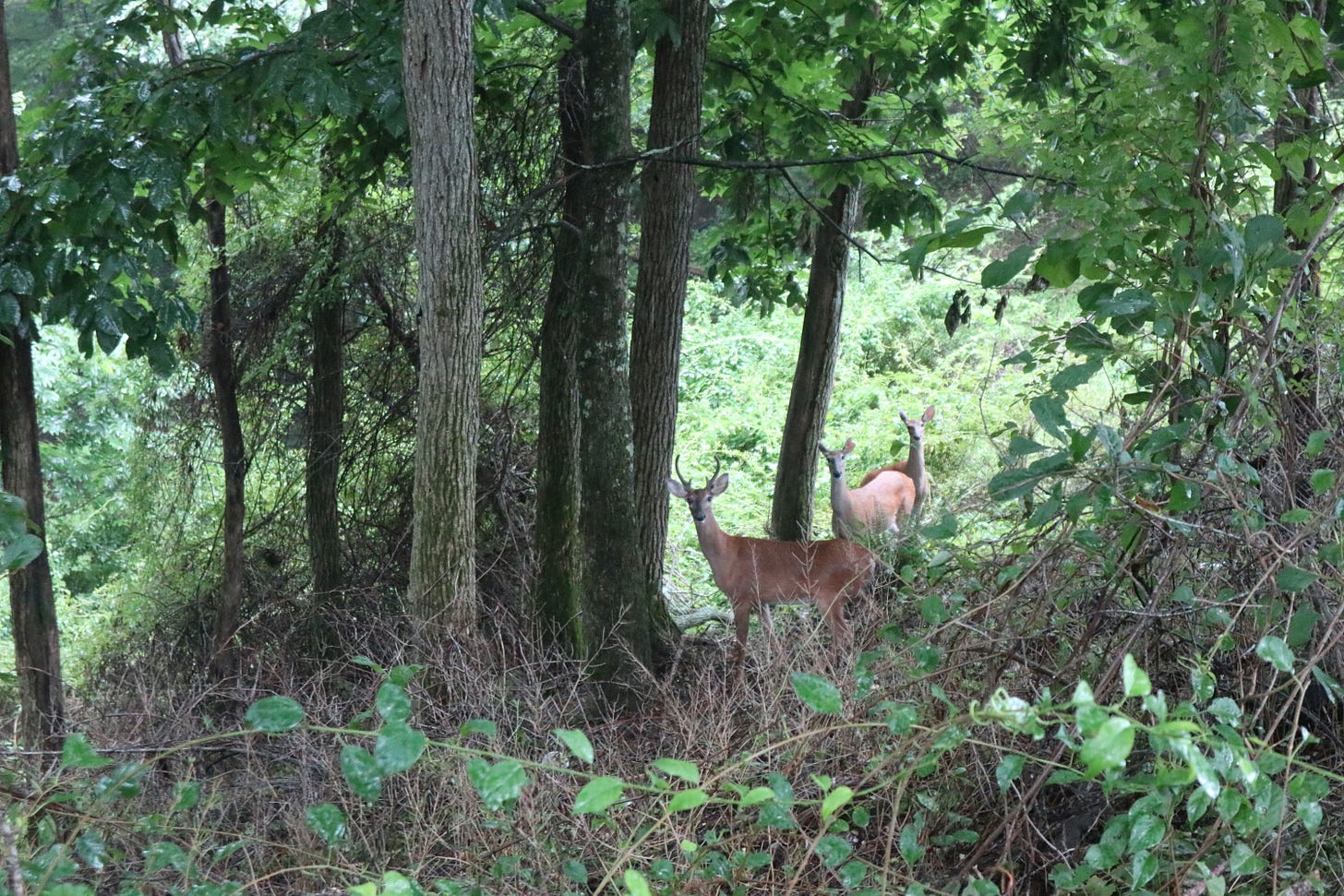The Sherlock Holmes of Small Town
Or, how you too can use your social inability to understand when something is not your business to your professional advantage
One of the most compelling aspects of journalism is the professional obligation to get into other peoples’ business. Once you’re sufficiently in someone else’s business, eventually the strands connecting things become clearer and you find out what the real problem is. I thought today’s post could be an example of how being a professional busybody works in practice using examples from my time in North Carolina. A bunch of this has been anonymized because it’s a little more behind-the-scenes than a published article.
Background: I know I’m spending about 4 days in Small Town in Appalachian North Carolina in the Blue Ridge mountains. Said Small Town is home to a University. This part of the trip was a little last-minute in coming together so all I know when I start out is that there is a student activist group at University who are upset about recent rate hikes from Electric Utility, which is actually owned by University. I know the rate hikes are largely due to the recent spike in natural gas prices (resulting partly from the war in Ukraine) and I know the Small Town is pretty damn liberal—plus University touts itself as being on the cutting edge of sustainability—so there would be support for solar, so I’m wondering why Utility is not more interested in building their own solar power. I also know that Utility, even though it is owned by University, powers not just the campus but the majority of Small Town locals as well. Here are the steps I follow to find out why this ideal spot for more solar investment (or wind) isn’t making the shift:
1. On Saturday I meet with Organizer from the student activist group at the County Farmer’s Market. They point out a few different people to talk to for starters: two University professors work the goat cheese stand and might have thoughts on how University handles Utility. They mention that it’s extremely unusual for a college or university to own and manage an electric utility, and because of this unique relationship there are weird politics involved—Utility doesn’t just answer to the state utilities commission, but also to the Board of Trustees for University and University admin. I decide I want to find out if people think University is holding Small Town hostage in some ways because it controls their electricity. Organizer also points out an ex-University admin member who sells art at the market and a local guy who has sold produce here since the 90s.
2. I decide to try and talk to all 3 booths because the #1 rule of reporting is that you talk to as many relevant people as possible if you have the time—this pays off time and again because people will surprise you with valuable info and connections. Never make an assumption about anybody’s opinions or level of knowledge, or you will suffer for it.
3. I talk to the produce guy—he isn’t extremely talkative and there are other customers in the booth so I just ask him how the growing season has been and we talk about how unusually hot and humid it is, which echoes what a lot of other rural folks I’ve talked to say about the weather. That info is helpful for a climate change story but I’m trying to hone in on the University/Utility relationship, so I file it away and move on. At the goat cheese booth I pretend to be interested in goat cheese fudge (I am lactose intolerant) so I can ask the professors questions about how they feel University is doing with its sustainability commitments. One of them mentions the tension in the town-gown relationship, talks about the lack of reliable public transportation, and also points out the fact that there’s a major student food insecurity issue because food and housing is very expensive in this rapidly growing town. This is all important context but energy issues are not necessarily her specialty so I get her contact info and pay a visit to Ex-Employee.
4. I make small talk for a bit before explaining why I’m in the area and Ex-Employee is eager to talk with me about the University/Utility situation, though he wants to be off-the-record for the moment. I understand how fragile relationships are in a town with a year-round local population of 20,000, so I agree. He explains that Town Council and municipal employees wish Small Town could go solar, but Utility has been resistant to this idea. I point out that the students also seem pro-solar, as well as the town residents. I make a note-to-self to ask someone why state representatives for County don’t step in on behalf of Small Town and try to get this done, if there’s local support. Even University says it’s trying to be on the leading edge of sustainability, at least nominally. Ex-Employee explains that University has to answer to a conservative Board of Governors at the state level, so University is hesitant to put their money into renewable energy projects. It seems to me that this is not a convincing excuse for University, because the reality is Utility has an obligation not just to please University higher-ups but to serve the town and, at least in the long run, solar would be cheaper for customers and possibly more reliable. However, University calls the shots over Utility, putting things in gridlock. Now I need to find out who is trying to change Utility or University’s mind(s).
5. I have a meeting with Town Council Member and Municipal Employee on Monday, so after the farmer’s market I go home and make a convoluted diagram to try to explain to myself how everything in University is connected—who has authority over what. I do this for an hour and then probably binge-watch Grey’s Anatomy until I’ve forgotten what a Chancellor is.
6. Between Saturday and Monday I talk to Organizer and get a sense of the student activists’ relationship to every other entity—University, Utility, other student groups, Small Town, Town Council, etc. Organizer says that in their opinion, University has stopped serving the genuine interests of students or Small Town and instead solely pays attention to Board of Trustees, Board of Governors, and the football program. Organizer says they’re regularly in contact with Small Town government to try to do something about the rate hikes, affordable housing, and the town-gown relationship generally. I make a note to ask the government representatives about this relationship with student activists.
7. It’s Monday and I meet with Town Council Member and Municipal Employee. This is my opportunity to get to the bottom of what is causing the disconnect between Utility’s reluctance to build solar and Small Town’s desire for solar. The two of them say Utility’s leadership actually seems interested in finding a way to buy more solar power and maybe even build some eventually, but University has authority over Utility. Town Council Member, who is an alum of University, a former student activist, and an elected official, can speak the most freely. He says that because University takes direction from the “nightmarish” Board of Governors, there is little chance that they could convince BoG that what they need to spend money on is a rooftop solar system that will have a massive return-on-investment in the future, because BoG wants to see profits now, and they want to see University expand its student body instead. BoG (and by extension Board of Trustees) wants money spent on new dorm buildings instead of changing where Utility gets energy from. The upfront investment is too much for BoG to approve of, and University is not about to go rogue. I ask why Small Town doesn’t defy Utility and build their own solar, and Municipal Employee explains that land is too expensive and not plentiful enough in Small Town and they would need to buy within the bounds of Town. I ask why Town can’t expand, as most incorporated towns are able to. Municipal Employee explains that Town’s land expansion was permanently stopped some time ago because Town votes blue and County votes red, so County representatives got the state legislature to stop Town’s ability to expand as punishment (very unusual for a state legislature to be able to just stop a town from expanding, but in North Carolina it’s possible), and now they cannot acquire land for solar.
8. Stop the presses! Or start the presses! Now I know I have my story. In Small Town, Republican influence in the Board of Governors and the state legislature is able to stifle some of the progress towards cheaper renewable energy, even though Town has shown support for it, students have shown support, University has nominally embraced sustainability, and University in theory could cough up the money.
9. Now it’s time to pitch, which means sitting in the Barnes and Noble Café for hours trying to find the right editor’s contact information. If I have any luck with publishing, you all will be the first to know!






